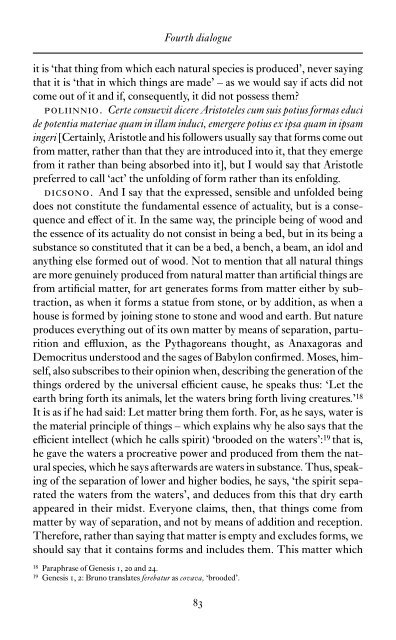Create successful ePaper yourself
Turn your PDF publications into a flip-book with our unique Google optimized e-Paper software.
Fourth dialogue<br />
it is ‘that thing from which each natural species is produced’, never saying<br />
that it is ‘that in which things are made’ – as we would say if acts did not<br />
come out of it and if, consequently, it did not possess them?<br />
POLIINNIO. Certe consuevit dicere Aristoteles cum suis potius formas educi<br />
de potentia materiae quam in illam induci, emergere potius ex ipsa quam in ipsam<br />
ingeri [Certainly, Aristotle and his followers usually say that forms come out<br />
from matter, rather than that they are introduced into it, that they emerge<br />
from it rather than being absorbed into it], but I would say that Aristotle<br />
preferred to call ‘act’ the unfolding of form rather than its enfolding.<br />
DICSONO. And I say that the expressed, sensible and unfolded being<br />
does not constitute the fundamental essence of actuality, but is a consequence<br />
and effect of it. In the same way, the principle being of wood and<br />
the essence of its actuality do not consist in being a bed, but in its being a<br />
substance so constituted that it can be a bed, a bench, a beam, an idol and<br />
anything else formed out of wood. Not to mention that all natural things<br />
are more genuinely produced from natural matter than artificial things are<br />
from artificial matter, for art generates forms from matter either by subtraction,<br />
as when it forms a statue from stone, or by addition, as when a<br />
house is formed by joining stone to stone and wood and earth. But nature<br />
produces everything out of its own matter by means of separation, parturition<br />
and effluxion, as the Pythagoreans thought, as Anaxagoras and<br />
Democritus understood and the sages of Babylon confirmed. Moses, himself,<br />
also subscribes to their opinion when, describing the generation of the<br />
things ordered by the universal efficient cause, he speaks thus: ‘Let the<br />
earth bring forth its animals, let the waters bring forth living creatures.’ 18<br />
It is as if he had said: Let matter bring them forth. For, as he says, water is<br />
the material principle of things – which explains why he also says that the<br />
efficient intellect (which he calls spirit) ‘brooded on the waters’: 19 that is,<br />
he gave the waters a procreative power and produced from them the natural<br />
species, which he says afterwards are waters in substance. Thus, speaking<br />
of the separation of lower and higher bodies, he says, ‘the spirit separated<br />
the waters from the waters’, and deduces from this that dry earth<br />
appeared in their midst. Everyone claims, then, that things come from<br />
matter by way of separation, and not by means of addition and reception.<br />
Therefore, rather than saying that matter is empty and excludes forms, we<br />
should say that it contains forms and includes them. This matter which<br />
18 Paraphrase of Genesis 1, 20 and 24.<br />
19 Genesis 1, 2: Bruno translates ferebatur as covava, ‘brooded’.<br />
83

















